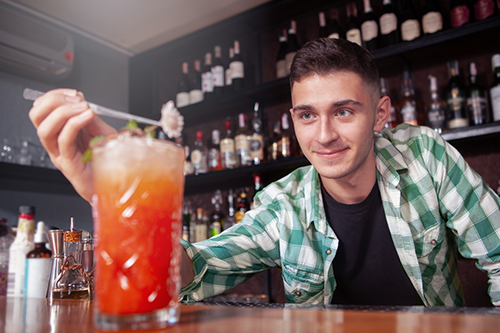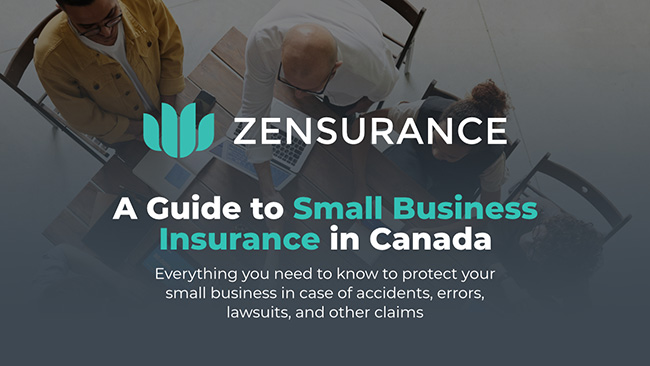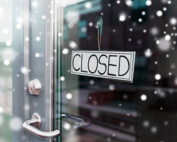Regularly selling and serving alcohol at your establishment or temporarily for a party or event presents numerous liability risks for business owners and hosts.
In either scenario, a business owner or event host can be liable for accidents, damages, and injuries to someone or others that are caused by an intoxicated person who consumed alcohol on your premises or at your event.
For example, data from the Traffic Injury Research Foundation (TIRF) states that 391 Canadians were killed in an impaired driving crash, accounting for 26.5% of all fatal road crashes in 2021. TIRF survey data from 2023 also finds that 24.5% of Canadians who admitted to driving after drinking say they consumed alcohol in a restaurant, 6.2% admit to doing so at a bar or pub, and 1.4% say they did at a party or event.

Download Our FREE Insurance Guide
Learn everything you need to protect your small business.
Whitepaper download
"*" indicates required fields
Your email address will be used by Zensurance to provide latest news, offers and tips.
You can unsubscribe at any time.

Related Posts
Safeguarding against potential financial liabilities stemming from the actions of intoxicated individuals is a critical consideration for both event hosts and business owners. Understanding the distinct scopes of liquor liability insurance and host liquor liability insurance is fundamental in proactively managing these risks.
Let’s explore each type of coverage so you can make an informed decision:
What Is Liquor Liability Insurance?
Liquor liability insurance covers businesses that sell or serve alcoholic beverages, such as bars and pubs, restaurants, and nightclubs.
It’s designed to help business owners pay for costs associated with claims against their establishments alleging third-party bodily injury or third-party property damage caused by an intoxicated person who consumed alcohol at their businesses.
If one of your customers becomes intoxicated at your establishment and injures themselves or others on your premises or after leaving it, you or your employees may be liable.
What Is Host Liquor Liability Insurance?
Host liquor liability insurance, also called event liability insurance or social host liability insurance, covers individuals, businesses, and event planners hosting social events, parties, or gatherings where alcohol is served. However, they do not typically serve, sell, or manufacture alcohol as part of their regular activities.
Any private party, wedding, banquet, employee celebration, or corporate event that involves selling or serving alcohol poses significant risks regardless of where the event occurs.
This type of policy protects hosts from liabilities arising from accidents or injuries, such as slip and fall accidents, automobile accidents, or property damage that happens to an intoxicated guest or others by an intoxicated guest who consumed alcohol at their event.
5 Ways to Prevent Liquor-Related Accidents and Claims Against You
In addition to knowing the signs of intoxication, refusing to serve alcohol to intoxicated guests, and displaying Mothers Against Drunk Driving (MADD) Canada posters wherever alcohol is served, here are five ways to reduce your liquor liability risk and ensure no one who consumes alcohol in your establishment or at your event is injured or injures others:
1. Limit Alcohol Serving Sizes
Monitor how many drinks your customers and guests consume and their behaviour for signs of intoxication. Limit the number and size of alcoholic drinks you serve each person, and offer low-alcohol and non-alcoholic beverages as alternatives.
2. Offer Food
Promoting and offering a variety of foods to customers and guests helps slow alcohol consumption and may reduce the effects of intoxication.
3. Train Employees on Responsible Alcohol Service Techniques
If you have employees, ensure they’re licensed to serve alcohol by your provincial liquor service and sales programs like Smart Serve in Ontario or ProServe in Alberta. Also, ensure they know what to do if a customer or guest drinks too much.
4. Provide Transportation Options
Provide your guests with options to get home safely, such as directing them to public transit stops or hailing a taxi or ridesharing service. Furthermore, it’s worthwhile to partner with local transportation services and ridesharing companies to offer safe transportation options for those unable to drive.
5. Maintain a Safe Environment
Whether it’s your bar, restaurant, or venue you rent to host an event, ensure the place has adequate lighting and is free from potential trip hazards. Ideally, the space where your customers or guests gather should have non-slip flooring and be clutter-free.
Getting the Liquor Liability Protection You Need Now
Getting comprehensive and cost-effective liquor liability insurance for your business or event is easy through Zensurance.
Our streamlined process facilitates swift access to tailored, affordable protection, ensuring that you have the right coverage in place when you need it most. Take the first step by filling out our online application for a free quote today.
Let us take the hassle of finding a policy that suits your business or event off your hands. We’ll shop our partner network of over 50 insurers for a low-cost policy and customize it to suit your needs.
Fill out our online application for a free quote now.
Recent Posts
Why November Is the Perfect Time for Bookkeepers to Review Their Insurance
As we inch toward the end of another year, bookkeepers are busy preparing for the end of their clients’ financial year. But now is the ideal time for bookkeepers to review and assess their insurance. We’ll give you 10 reasons why.
Is Your Salon Ready for the Holidays? Insurance Tips for Beauticians
Salon owners and independent beauticians need to stock up on the products they need to make their clients shine over the holidays. But ensuring they're adequately covered with customized insurance is also critical. Here's what to know.
10 Tips for Closing Your Small Business for the Winter
Are you closing up shop for the winter? Ensuring your property is prepared for winter and your valuable contents and inventory are safely stored is vital. See our tips for how small business owners can shut down operations and keep their assets safe.








